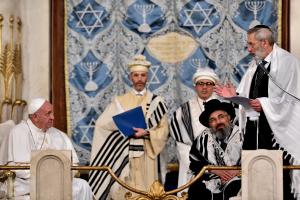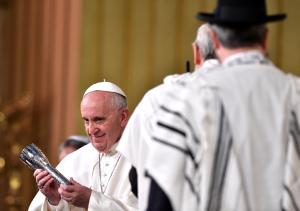|
Rome (AFP) - Pope Francis on Sunday made his first visit to a synagogue as pontiff, citing an "unbreakable" bond between Jews and Christians as hundreds of armed security personnel were deployed for the Rome visit.
Francis is the third pope to visit the Great Synagogue in Italy’s capital after John-Paul II in 1986 and Benedict XVI in 2010.
Located just across the River Tiber from the Vatican, it stands in an area still known as the Ghetto where under the orders of some of Francis’s predecessors, Jews were confined for more than three centuries until their emancipation at the end of the 19th Century.
Evoking "the unbreakable bond between Jews and Christians", the pope delivered a message of peace.
"Violence against men is in contradiction with any religion worthy of the name, and in particular the big monotheist religions," he said, in his first visit to a synagogue since being elected pope in 2013.
He urged rejection of "all forms of anti-Semitism", saying: "we must condemn any abuse, any discrimination and persecution stemming from it."
View gallery

Pope Francis listens to chief Rabbi Riccardo Di Segni (R) in Rome’s main Synagogue on January 17 …
The pope was greeted with applause as he arrived and was met on the synagogue steps by Rome’s chief rabbi Riccardo Di Segni.
Francis in turn greeted some 1,500 invited guests who filled the religious site to witness the pontiff’s visit.
After the deadly attacks in Paris in November, claimed by the Islamic State group, security for the visit was particularly tight, with basements in the area around the synagogue searched, dustbins sealed and parking banned.
Fears of a Paris-style assault in Rome have seen visitor numbers fall, while soldiers with automatic rifles have become a common sight around the city’s historic centre.
On Sunday Francis also welcomed 5,000 migrant worshippers at a special mass at St Peter’s to mark the world day of migrants and refugees, urging them to treasure their "culture and precious values".
View gallery

Pope Francis shows a gift at the end of his visit at Rome’s main synagogue on January 17, 2016 ( …
- Centuries of anti-Semitism -
Ties between the Christianity and Judaism, which improved under both John-Paul II and Benedict XVI, have become warmer still under Francis, who has a long-standing friendship with Argentinian rabbi Abraham Skorka, with whom he jointly published a book of conversations about issues of ethics, morality and faith.
As part of his visit, the pope was to view two commemorative plaques in the synagogue’s gardens, one marking an incident in 1943 when more than 1,000 Jews were rounded up and deported to the Nazi death camp of Auschwitz and the other a 1983 attack on the building that left 37 injured and one dead.
"Six million people, simply because they belonged to the Hebrew people, were victims of the most inhuman barbarity, perpetrated in the name of an ideology that wanted to put man in God’s place," Francis said.
On the final days of his Middle East tour in May 2015, the pontiff said prayers at the Western Wall in Jerusalem -- the holiest site at which Jews are allowed to pray.
A key question that has long blighted relations between the two faiths was addressed in December when senior Catholic theologians said Jews can secure eternal salvation without converting to Christianity.
"Although Jews cannot believe in Jesus Christ as the universal redeemer, they have a part in salvation, because the gifts and the calling of God are irrevocable," the report concludes, according to a summary released to the media.
The belief that the only way to salvation is through belief in Christ is a fundamental tenet of every strand of Christianity.
But it has also been blamed for creating an evangelical tendency responsible for some of the darkest periods in the history of religion, notably the anti-Muslim crusades of the Middle Ages and centuries of Christian anti-Semitism. |



